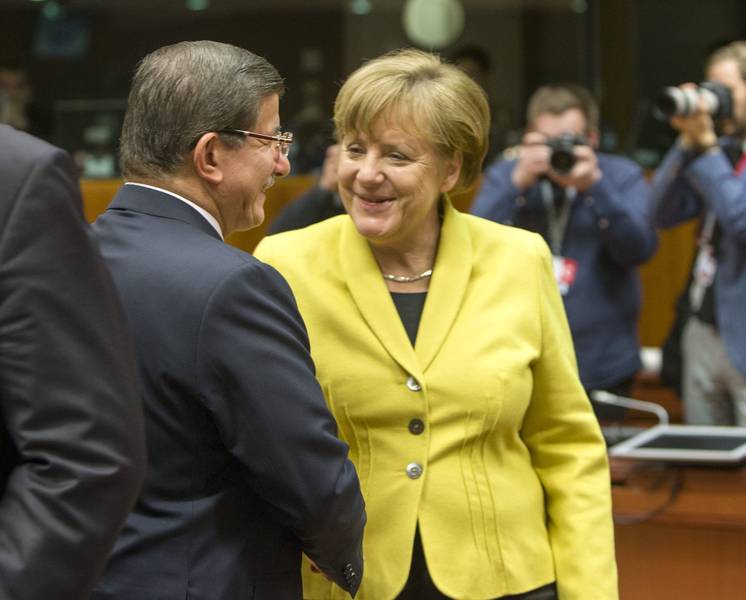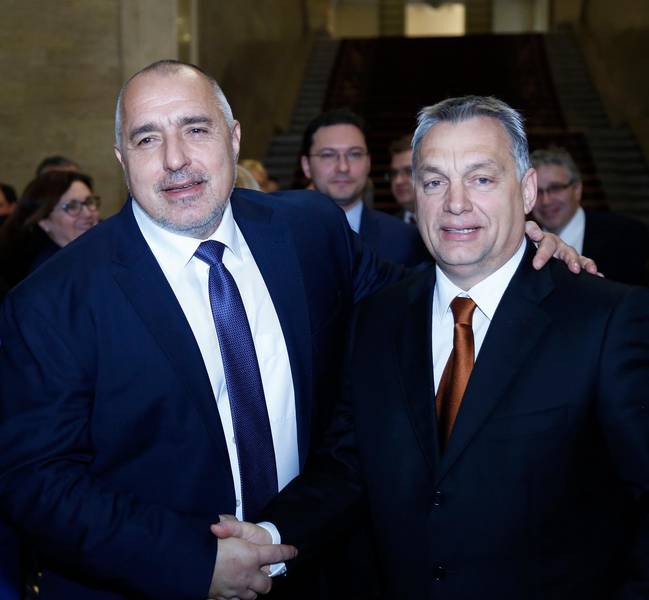Kill a Cartoon, Save a Dictator!
Adelina Marini, April 18, 2016
A year ago everyone was “Charlie Hebdo”. Terrorists broke into the office of the French satirical magazine on 7 January 2015 and murdered 12 people. This was viewed all over Europe and beyond as an attack on freedom of speech, regardless of the bad aftertaste that many of the magazine’s cartoons left. The reaction to the terrorist attack was so strong that on January 13 a Unity March was held in Paris, which was attended by dozens of world leaders, among whom were Turkish Prime Minister Ahmet Davutoğlu, German Chancellor Angela Merkel, and Bulgarian PM Boyko Borissov. I intentionally name just these three, for there is a follow-up to this story. Back then euinside reported that many of the world leaders present at the procession had controversial attitudes to freedom of expression to say the least.
Moreover, in a number of countries, whose leaders appeared besides French President François Hollande, freedom of speech has been systematically violated, journalists are being murdered or sent to prison for having a different opinion, criticising the government, or something else. In this sense, the British newspaper The Guardian published a very good interactive photograph of these leaders.
This could have been read as a sign of solidarity and commitment by these leaders that the attacks against the freedom of expression had gone too far. It would have been too optimistic to think that the attendance of authoritarian leaders with a long track record of media repressions was a sign of a change in their attitudes towards media, but, anyway, the symbolic importance of January 13 was huge and echoed worldwide, arising hope that perhaps media persecution was coming to an end. Alas, a year later the situation is still as charliehebdo as ever, and this in the very heart of Europe, which demands it from EU membership candidate countries that they ensure independence of media, investigate the murders of journalists, stop the persecutions, dismissals, and pulling of critical and satirical shows off the air, stimulating investigative journalism, and so on and so forth.
If until recently it was just Hungarian PM Viktor Orbán that smudged the EU’s image of a pillar of democracy, the best human values and fundamental rights, a year later he already has many followers. In the largest country from the EU’s big bang enlargement of 2004 and 2007 – Poland – at the end of the “Charlie Hebdo” year a government came to power, which has, in best case scenario, avid liking for Orbánism. The Law and Justice party came to power with a resounding victory and one of its first orders of business was harnessing the media and the Constitutional Court, which provoked the European Commission into activating for the first time the so called rule of law mechanism. After Poland, there were considerable changes happening in Croatia as well, where the government that came to power has participants from the most  popular political party at the moment, Croatian Democratic Union (HDZ), which took an extremely conservative course over the last couple of years and positioned itself in the far right.
popular political party at the moment, Croatian Democratic Union (HDZ), which took an extremely conservative course over the last couple of years and positioned itself in the far right.
A re-run of the Polish scenario followed – changes at the helm of the state radio and television, the Council for Electronic Media, cutting off of the financing of independent and non-profit media, pulling a satirical show off the air of the national television, threatening messages to journalists, who suffered beatings coming, from the highest levels of government. In Bulgaria, the situation deteriorated dramatically as well, regardless of having a well-known to the EU sole governor in power there, whose authoritarian potential is highly underestimated – Boyko Borissov, who is doing a second term as a prime minister. The situation in the poorest country of the EU is somewhat different from Poland, Hungary, or Croatia, but the result is identical – dependent media, pressure, and from last week there is the first fired cartoonist in the country – Chavdar Nikolov.
His contract was not renewed by the privately owned Nova television, and his video cartoon was taken off the video channels owned by the television with no explanation given. This is the most audacious of all cases in the EU, for we are talking about a really intelligent and stylish video cartoon, depicting how Bulgaria has changed since its creation in 681 AD. The video cartoon begins with a banner “681 – horse’s tail”, because back then, when the Bulgarian state was created, it was the symbol of leaders of that time. Then a banner appears: “2016 – a cable tie”. The irony is in the fact that this year a hero for Bulgarians became Dinko from Yambol, who leads a “civil” squad of hunters of illegal migrants along the border with Turkey and who received official support from PM Borissov. The prime minister himself is depicted in the video cartoon, accompanied by Dinko and a number of other goons. The message is very powerful and the cartoon got a strong response in social media.
And if in the cases of Hungary, Poland, Croatia, and Bulgaria we are talking about new EU members, who have spent half the 20th century in totalitarianism and thus their authoritarian inclination could be explained, a major treason was committed by German Chancellor Angela Merkel, also last week. M. Merkel, until recently a symbol of united Europe, of justice, humanity and Europe-ness in general, yielded to pressure by Turkish President Recep Tayyip Erdoğan and gave her consent to opening an investigation against the German satirical comedian Böhmermann. He is “guilty” of some extremely tasteless and really quite offensive satire, in which he jokes with the Turkish president’s sexual preferences. Offensive or ugly, Jan Böhmermann’s satire is nothing different from “Charlie Hebdo” and its cartoons. The comedian became extremely popular outside Germany with his song, dedicated to Greece's ex-finance minister Yanis Varoufakis from last year, aired on the German state-owned second channel ZDF.
Before Böhmermann, Turkey objected to another satirical depiction of Erdoğan, which could not be qualified as offensive, but could hardly be called funny either. The decision of the German chancellor to give a green light to Böhmermann’s prosecution sends a very bitter message to the very few and becoming fewer states in the EU where freedom of speech, however tasteless, even disgusting, may be, is highly valued. But it shows something much scarier – that Europe has lost its transformational power, which it boasted with for decades. Instead of the EU changing authoritarian states in its image, conditioning them to democracy, respect for the different opinion, fundamental rights and the most modern human values, it is turning into those which it was called to transform.
What happened to Je Suis Charlie, which was donned by every world leader present in Paris last year? Did the EU turn away from its most fundamental values, which blood was shed for on the European continent for centuries? Does the end justify the means when we are talking about dealing with the refugee crisis and satisfying the demands of a dictator? It is high time the EU looked in the mirror, just like PM Boyko Borissov was asked to do earlier this year in London, and say what it sees. Whether it sees the faces of the leaders, who signed the Maastricht Treaty, where common values are mentioned for the first time, or the many authors of the Treaty of Lisbon,  where European values are much more extensively specified in Article 2, or whether it sees the collective image of Orbán, Kaczyński, Borissov, Karamarko, and Erdoğan?
where European values are much more extensively specified in Article 2, or whether it sees the collective image of Orbán, Kaczyński, Borissov, Karamarko, and Erdoğan?
If the EU should fail and disintegrate the reason would be the too many compromises with values, made in the name of short-term political gains. This would smear the memory of the thousands who lost their lives defending the various freedoms, which the EU prides itself with. It would mean the rebuilding of the Berlin wall, which separated the free world from the authoritarian one, only the free world would be small and fenced like a reservation. One day the refugee crisis will be over, but what will Europe be like then?
Translated by Stanimir Stoev